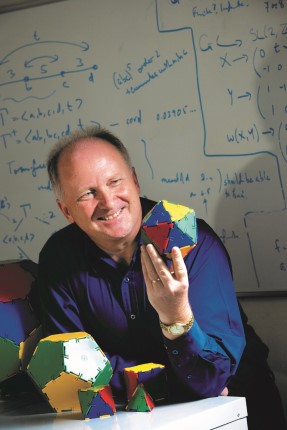News
Published 17 October 20182018 Jones Medal: Symmetry and open questions

Distinguished Professor Marston Conder FRSNZ has been awarded the Jones Medal by Royal Society Te Apārangi for his lifetime achievement and leadership in mathematics.
Professor Conder, University of Auckland, is a world authority on the mathematics of symmetry and chirality in discrete structures, especially those with maximum possible symmetry in their class. These structures include combinatorial graphs, maps, Riemann and Klein surfaces, polytopes (geometric objects with flat sides) and three-manifolds (structures that ‘locally’ look like 3-dimensional space).
Marston’s early work on structures known as Hurwitz groups and surfaces is one of the most important milestones in that field. More recently, he discovered gaps in the spectrum of chiral maps on orientable surfaces (a chiral object is different from all its mirror images). He also identified the smallest regular polytopes in all dimensions.
Marston is renowned for pioneering an array of algebraic, combinatorial and computational techniques to answer what are called ‘open’ and ‘challenging’ questions in mathematics and to see beyond them to make wider ground-breaking discoveries. Over the last three years, Marston has solved problems and answered open questions in mathematics dating back to 1962, 1967, 1985, 1998, 1999 and 2005.
He has published over 155 academic works, many in top-ranked journals and extensively cited. He has won eight Marsden Fund grants as Principal Investigator (holding them continuously since the inception of the Fund).
Also during his career Marston has been instrumental in developing and promoting New Zealand mathematics. He has served as secretary, councillor and president of the New Zealand Mathematical Society, and treasurer and founding co-director of the New Zealand Mathematics Research Institute. He was the founder and co-director of the New Zealand Institute of Mathematics and its Applications (NZIMA), which has been said to have significantly lifted research performance in the mathematical sciences in New Zealand, and he was the founder and editor of the NZ-IMAges bulletin and the MathsReach website.
He has had many other service roles for the research community, including as President of the Academy and Vice-President for Royal Society Te Apārangi, a member of the Marsden Fund Council, and chairperson of the government-appointed committee that created the PBRF in 2002.
He is a popular conference speaker, receiving many invitations each year, and has inspired and mentored a large number of students and colleagues worldwide. He has successfully supervised 12 PhD students, and has attracted over 100 mathematical visitors to New Zealand.
Reflecting on the changes in the field of mathematics over his career, Marston said that fifty years ago many people regarded the main role of maths as providing a tool-kit for physics, focussed on calculus, linear algebra and differential equations.
“That has changed quite dramatically. The subject and its applications have broadened immensely, especially with rapid advances in computing and IT, so that mathematics now plays an important role in a huge variety of activities, including bioinformatics, communications, economics/finance, internet searches, internet security, planning and social sciences.”
The medal selection committee noted that over the last 40 years, Marston has made outstanding contributions to mathematics internationally and locally, and his leadership and service to the New Zealand mathematical science community have been exemplary.
New Zealand-born Fields medallist Sir Vaughan Jones FRS, for whom the medal is named, says Marston is the best algebraist in New Zealand and is a “human dynamo” in his commitment to mathematics and science in New Zealand. “The renaissance of maths in New Zealand has been created principally by Marston Conder.”
On receiving this Medal, Marston said “It's wonderful to receive this award, especially for simply doing many things that I enjoy so much and it’s been a pleasure to spend most of my life and career in New Zealand, despite opportunities to pursue it overseas.
“None of this would have been possible without things for which I'm very grateful: the great education and upbringing I had in New Zealand, the encouragement from my family, the financial support I received from New Zealand to study for a doctorate at Oxford 40 years ago, and the wonderful partnership I've had with my wife Jenny.”
Marston received the New Zealand Mathematical Society’s Research Award in 1993, was made a Doctor of Science by the University of Oxford in 2000, and awarded a Distinguished Professorship by the University of Auckland in 2012. From Royal Society Te Apārangi he was awarded a James Cook Research Fellowship (2012-14) and the Hector Medal (2014). He has been awarded life membership of the New Zealand Mathematical Society, and fellowships of the American Mathematical Society (2013), Institute of Combinatorics & Applications (2004) and Royal Society of New Zealand (1998). Marston was one of the first two Hood Fellows (2005), and the first Maclaurin Lecturer (2013).
Jones Medal:
For lifetime achievement in mathematics.
Citation:
To Marston Donald Edward Conder for his internationally renowned research on symmetry and chirality in discrete structures, and his exemplary leadership and service in the New Zealand mathematical sciences community.
